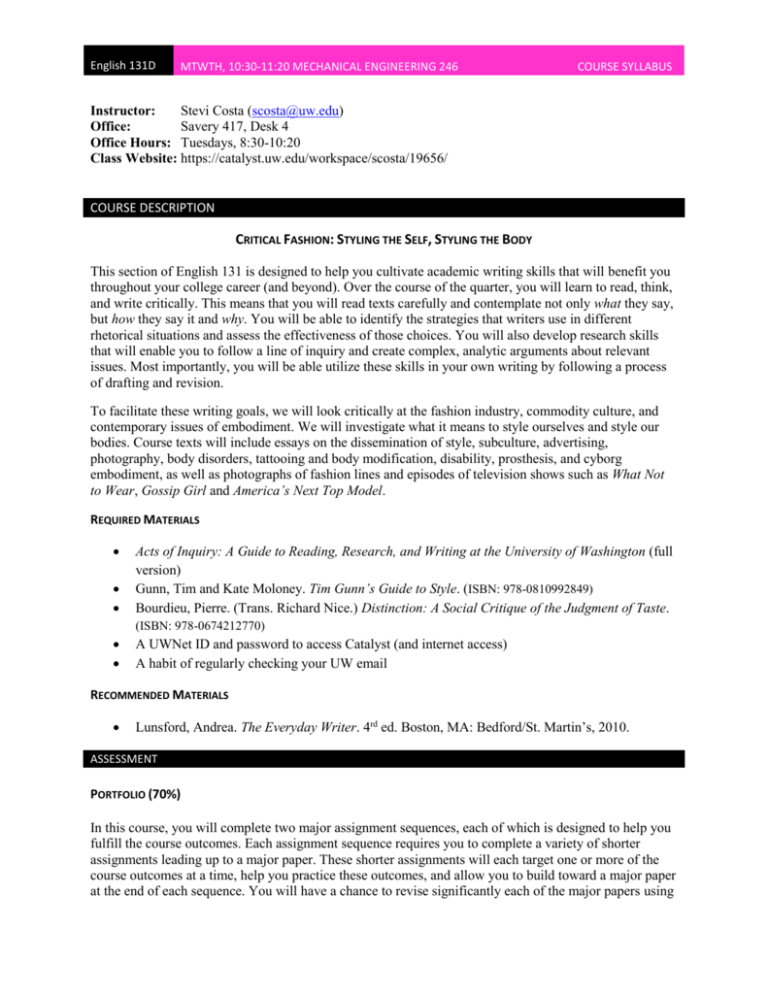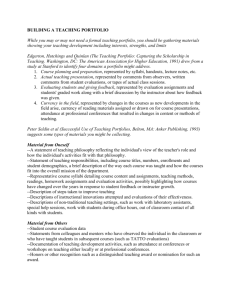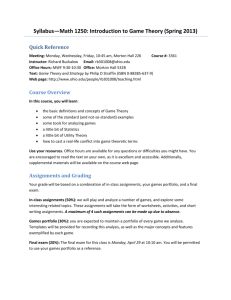File
advertisement

English 131D MTWTH, 10:30-11:20 MECHANICAL ENGINEERING 246 COURSE SYLLABUS Instructor: Stevi Costa (scosta@uw.edu) Office: Savery 417, Desk 4 Office Hours: Tuesdays, 8:30-10:20 Class Website: https://catalyst.uw.edu/workspace/scosta/19656/ COURSE DESCRIPTION CRITICAL FASHION: STYLING THE SELF, STYLING THE BODY This section of English 131 is designed to help you cultivate academic writing skills that will benefit you throughout your college career (and beyond). Over the course of the quarter, you will learn to read, think, and write critically. This means that you will read texts carefully and contemplate not only what they say, but how they say it and why. You will be able to identify the strategies that writers use in different rhetorical situations and assess the effectiveness of those choices. You will also develop research skills that will enable you to follow a line of inquiry and create complex, analytic arguments about relevant issues. Most importantly, you will be able utilize these skills in your own writing by following a process of drafting and revision. To facilitate these writing goals, we will look critically at the fashion industry, commodity culture, and contemporary issues of embodiment. We will investigate what it means to style ourselves and style our bodies. Course texts will include essays on the dissemination of style, subculture, advertising, photography, body disorders, tattooing and body modification, disability, prosthesis, and cyborg embodiment, as well as photographs of fashion lines and episodes of television shows such as What Not to Wear, Gossip Girl and America’s Next Top Model. REQUIRED MATERIALS Acts of Inquiry: A Guide to Reading, Research, and Writing at the University of Washington (full version) Gunn, Tim and Kate Moloney. Tim Gunn’s Guide to Style. (ISBN: 978-0810992849) Bourdieu, Pierre. (Trans. Richard Nice.) Distinction: A Social Critique of the Judgment of Taste. (ISBN: 978-0674212770) A UWNet ID and password to access Catalyst (and internet access) A habit of regularly checking your UW email RECOMMENDED MATERIALS Lunsford, Andrea. The Everyday Writer. 4rd ed. Boston, MA: Bedford/St. Martin’s, 2010. ASSESSMENT PORTFOLIO (70%) In this course, you will complete two major assignment sequences, each of which is designed to help you fulfill the course outcomes. Each assignment sequence requires you to complete a variety of shorter assignments leading up to a major paper. These shorter assignments will each target one or more of the course outcomes at a time, help you practice these outcomes, and allow you to build toward a major paper at the end of each sequence. You will have a chance to revise significantly each of the major papers using English 131D MTWTH, 10:30-11:20 MECHANICAL ENGINEERING 246 COURSE SYLLABUS feedback generated by your instructor, peer review sessions, and writing conferences. Toward the end of the course, having completed the two sequences, you will be asked to compile and submit a portfolio of your work along with a critical reflection. The portfolio will include the following: one of the two major papers four to six of the shorter assignments a “cover letter” -- a critical reflection that explains how the selected portfolio demonstrates the four outcomes for the course In addition to the materials you select as the basis for your portfolio grade, your portfolio must include all of the sequence-related writing you were assigned in the course (both major papers and all the shorter assignments from both sequences). A portfolio that does not include all the above will be considered "Incomplete" and will earn a grade of 0.0-0.9. The grade for complete portfolios will be based on the extent to which the pieces you select demonstrate the course outcomes. The portfolio will be worth 70% of your final grade. EVALUATION RUBRIC Throughout the quarter, your papers will receive feedback to help you identify what you are doing well and what you need to improve. The following evaluation rubric will be used as part of my feedback: Outstanding: Offers a very highly proficient demonstration of the trait(s) associated with the course outcome(s), including some appropriate risk-taking and/or creativity. Strong: Offers a proficient demonstration of the trait(s) associated with the course outcome(s), which could be further enhanced with revision. Good: Effectively demonstrates the trait(s) associated with the course outcome(s), but less proficiently; could use revision to demonstrate more skillful command of trait(s). Acceptable: Minimally meets the basic outcome(s) requirement, but the demonstrated trait(s) are not fully realized or well-controlled and would benefit from significant revision. Inadequate: Does not meet the outcome(s) requirement; the traits are not adequately demonstrated and require substantial revision on multiple levels. PARTICIPATION (30%) The other 30% of your grade will be based on participation. This means coming to class prepared to work, contributing to group discussions and collaborating with fellow students during in-class activities. (Nota bene: It is very difficult to participate if you don’t come to class.) COURSE POLICIES CONFERENCES You will meet with me twice during the quarter to discuss your work in the course. These conferences give you the opportunity to get feedback on your papers and to express any concerns, questions, or suggestions you might have about the course of assignments. Please come to conferences with papers English 131D MTWTH, 10:30-11:20 MECHANICAL ENGINEERING 246 COURSE SYLLABUS you’d like to discuss and questions about them. Conferences are mandatory and, if missed, will impact your participation grade. I will provide a sign-up sheet for conferences at least one week in advance. LATE WORK All assignments are due on the date specified during the first ten minutes of class. I ask that you also upload a digital copy of your paper in our Catalyst dropbox before the beginning of class on the day the paper is due. The digital copy is an insurance policy for you in case you can’t get to a printer or have an emergency that prevents you for coming to class. I will not accept any assignments via email. Unless you have spoken with me ahead of time, late work is due by the next class meeting. I will not give feedback on any assignments that are turned in late, so the onus is on you to acquire that feedback from a writing tutor at either CLUE or the OWRC. You will still need to complete late work, as your portfolio must include all assignments in order for it to receive a passing grade. As with attendance, turning in late work will affect your participation grade. If you are having trouble and may be unable to turn things in on time, please speak with me before the assignment is due. EXTRA CREDIT Due to the nature of the portfolio sequence, I cannot offer extra credit assignments as a replacement for missing or late work. However, I can offer extra credit to boost your participation grade. Any student seeking to complete an extra credit assignment can write a 2-4 page (double spaced, 12 pt Times New Roman) performance review of one of the following plays: 9 to 5 (downtown at the 5th Avenue Theatre, playing April 5th to April 24th) The Secret in the Wings (at UW’s Meany Studio Theatre, playing April 17th-May 1st) Guys and Dolls (downtown at the 5th Avenue Theatre, playing May 12th-June 5th) Picasso at the Lapin Agile (at UW’s Hughes Penthouse Theatre, playing May 15th-29th) Urinetown (presented by UW’s Undergraduate Theatre Society, playing May 26th-June 5th) You may repeat the extra credit assignment as many times as you wish. My purpose in offering the performance review as extra credit is not only to introduce you to the thriving performing arts community at the University of Washington (through which you are supporting your fellow students) and Seattle, but also to practice the analytical skills you will learn in this class outside of the classroom. The prompt for the extra credit assignment will be posted on the course website. PLAGIARISM Plagiarism, or academic dishonesty, is presenting someone else's ideas or writing as your own. In your writing for this class, you are encouraged to refer to other people's thoughts and writing--as long as you cite them. As a matter of policy, any student found to have plagiarized any piece of writing in this class will be immediately reported to the College of Arts and Sciences for review. COMPLAINTS If you have any concerns about the course or your instructor, please see the instructor about these concerns as soon as possible. If you are not comfortable talking with the instructor or not satisfied with the response that you receive, you may contact the following Expository Writing staff in Padelford A-11: English 131D MTWTH, 10:30-11:20 MECHANICAL ENGINEERING 246 COURSE SYLLABUS Anis Bawarshi, Director: (206) 543-2190 or bawarshi@uw.edu Nancy Fox, Asst. Director: (206) 543-9126 or nafox@uw.edu Chelsea Jennings, Asst. Director: (206) 543-6998 or helsi@uw.edu Lindsay Rose Russell, Asst. Director: (206) 543-9126 or russellr@uw.edu If, after speaking with the Director of Expository Writing or one of the Assistant Directors, you are still not satisfied with the response you receive, you may contact Gary Handwerk, English Department Chair, in Padelford A-101, at (206) 543-2690. RESOURCES ACCOMMODATIONS If you need accommodation of any sort, please let me know so that I can work with the UW Disability Resources for Students (DRS) to provide what you require. This syllabus is available in large print, as are other class materials. More information about accommodation may be found at http://www.washington.edu/students/drs/. UW SAFECAMPUS Preventing violence is everyone's responsibility. If you're concerned, tell someone. Always call 911 if you or others may be in danger. Call 206-685-SAFE (7233) to report non-urgent threats of violence and for referrals to UW counseling and/or safety resources. TTY or VP callers, please call through your preferred relay service. Don't walk alone. Campus safety guards can walk with you on campus after dark. Call Husky NightWalk 206-685-WALK (9255). Stay connected in an emergency with UW Alert. Register your mobile number to receive instant notification of campus emergencies via text and voice messaging. Sign up online at www.washington.edu/alert For more information visit the SafeCampus website at www.washington.edu/safecampus. WRITING RESOURCES I encourage you to take advantage of the following writing resources available to you at no charge: The CLUE Writing Center in Mary Gates Hall is open Sunday to Thursday from 7pm to midnight. The graduate tutors can help you with your claims, organization, and grammar. You do not need to make an appointment, so arrive early and be prepared to wait. The Odegaard Writing Center is another excellent resource for writers. Tutors in this center can assist writers with their papers from any subject area. Set up an appointment on http://depts.washington.edu/owrc/.






